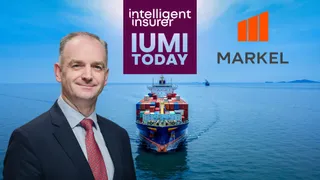
How alternative fuels, cyber and war are reshaping hull underwriting
Shipping has always been at the mercy of geopolitics, but rarely has the seascape shifted so quickly. For Paul Western, head of hull underwriting and senior underwriter, war, at Markel International, the challenge is to stay nimble and keep clients moving in a world where routes, risks and even fuel types are in flux.
Key points:
Straits of Hormuz is a key concern
Cyber threats risk vessel total loss
Alternative fuels pose underwriting unknowns
“We’ve maintained and continue to support our clients through these challenging times,” Western told IUMI Today. “The geopolitics are changing on a daily basis. We’ve worked with clients to enable them to continue global sea trade where they possibly can, helping them to transition smoothly.”
Three regions dominate Markel’s war risk focus: the Red Sea, the Persian Gulf and Russia-Ukraine. “The situation is extremely fluid, and geopolitics continues to influence world trade,” Western explained.
The Straits of Hormuz in the Persian Gulf remains a particular concern. “If it were to be closed, that has the potential for blocking and trapping issues.”
The Russia-Ukraine conflict is equally volatile, with the oil price cap adding to complexities. “Listening to what goes on in the political world has a big impact,” he added. “We’re keeping a very close eye on these situations through our intelligence partners to ensure we continue to provide market-leading solutions to our clients.”
The Red Sea crisis has already shifted trade patterns dramatically. “Around 27 percent of world trade is now going through the Red Sea,” Western noted. “It’s still being maintained as a shipping lane, but a lot of vessels have opted to go around the Cape of Good Hope.”
On Ukraine, Western explained how Markel’s flexibility helped client needs. “When the early conflict took place, vessels weren’t calling there. But as a market leader, we adapted to support our clients that needed, for example, to get grain out to where it was needed. We’re here to provide solutions to support the global trade.”
He stressed that this responsiveness was central to Markel’s philosophy. “We are a market leader in hull and war, and therefore we’re here to support our clients through these challenging and transitional times,” he explained.
Staying responsive requires timely intelligence, and Markel partners with third-party agencies to gather data and assess voyages in real time. “If we have a particular type of risk, we can use the intel to assess risk information regarding that region. This way, we make sure the voyage is protected and that the crew, vessel and cargo are safe.”
Looking ahead, Western sees two emerging trends that could redefine hull underwriting: cyber and alternative fuels. “Cyber threat is one of the compromises,” he warned. “Critical systems on the vessels such as the GPS, electronic chart display and information system or automatic identification system could be compromised, resulting in mis-routing, potential collisions, grounding, or in the worst case, a total loss.”
Western added that situational awareness could be lost entirely, leaving crews exposed to cascading risks if navigation and communication systems failed simultaneously.
New fuels
The industry’s energy transition adds another layer of uncertainty. “People have moved over to liquid natural gas, but further down the line there is methanol, ammonia, hydrogen, biofuels and even nuclear fuel,” Western stated. “It’s a real unknown at the moment; the world is ever changing as we move into the ‘greener’ phase of shipping.”
“Collaboration is paramount, particularly as these risks continue to develop.” Paul Western
He underlined that underwriters would need to balance innovation with caution due to the “many unknowns”, but that the market needed to ensure it was ready to adapt as these fuels develop and are brought into wider use.
For all this change, one principle remains constant: collaboration. Western emphasised that reinsurers, brokers, claims teams and underwriters must work hand in hand. “Collaboration is paramount, particularly as these risks continue to develop,” he said.
“Even though the media coverage of the Russia’s war against Ukraine has decreased, it’s important we don’t get complacent. It’s still a forever changing area.”
Markel’s philosophy is grounded in long-term partnerships. “We offer a first-class claims service if and when required,” Western concluded. “We’re very proactive in working with our clients, with a great relationship on both the claims and the underwriting sides.
“We’re here for the future, not just tomorrow.”
For more news from IUMI Today, click here.
Did you get value from this story? Sign up to our free daily newsletters and get stories like this sent straight to your inbox.
Editor's picks
Editor's picks
More articles
Copyright © intelligentinsurer.com 2024 | Headless Content Management with Blaze

